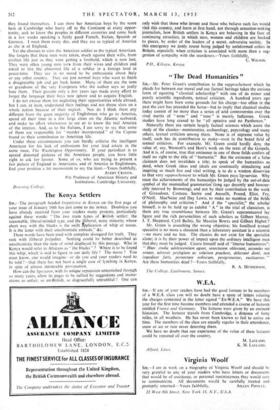The Kenya Settlers
Snt,—The paragraph headed Impatience in Kenya on the first page of your issue of January 16th has just come to my notice. Doubtless you have already received from your readers many protests, particularly against these words: "The two main types of British settler; the reasonable, liberal-minded type, and the liberal, noisy minority whose short way with the blacks is the swift Ypplication of whip or noose. It is the latter with their anachronistic attitude," &c.
These words have been used with complete disregard for truth. They reek with illiberal prejudice. Nothing could be better described as anachronistic than the state of mind displayed by this passage. Who in Kenya would refer to Africans as " the blacks " ? Where is to be found this whip, which' is said to figure in our daily life ? The noose ? You must know, one would imagine—or do you and your readers need to be told ?—that there has not been a single case of lynching in Kenya, in spite of almost intolerable provocation.
How can the Spectator, with its unique reputation untarnished through so many years, allow its pages to be sullied by suggestions and insinu- ations so unfair, so un-British, so disgracefully untruthful ? One can only wish that those who invent and those who believe such lies would visit this country, and learn at first hand, not through sensation-seeking journalists, how British settlers in Kenya are behaving in the face of continuing atrocities, in which men, women and children are hacked to pieces, by order of the leaders of a secret, subversive society. In this emergency we justly resent being judged by uninformed critics in Britain, especially when criticism is associated with more than a sug- gestion of sympathy with the murderers.—Yours faithfully,
P.O., Kikuyu, Kenya. -
C. WILSON.


































 Previous page
Previous page